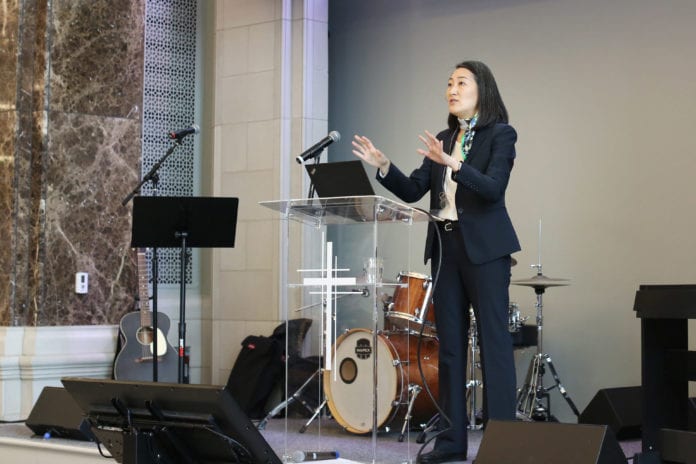Co-sponsored by the College of Sciences & Mathematics, Dr. Se Kim spoke in Belmont’s chapel on Wednesday, October 30 to discuss the relationship of science and society and working toward a common good. Dr. Kim holds a Ph.D. in Molecular & Human Genetics, an MBA and was a fellow with the National Institute of Health. Kim leads the American Association for the Advancement of Science as Deputy Chief Programs Officer and has presented her research in publications such as Journal of Neuroscience and Current Biology.
Kim said there are three ways that science and religion can interact, but Americans mostly think the two are in conflict with one another. With 70 percent of the United States claiming to be religious, Kim said help is needed to work toward the common good.
She started with a quote from Rabbi Johnathan Sacks. He said, “Science is about explanation. Religion is about meaning. Science analyses, religion integrates. Science breaks things down to their component parts. Religion binds people together in relationships of trust. Science tells us what is. Religion tells us what ought to be… Science sees objects. Religion speaks to us as subjects. Science practices detachment, Religion is the art of attachment, self to self, soul to soul.”
“Science can’t answer questions of identity, purpose, significance, suffering or beauty,” said Kim. “When we look at the neurological evidence of how memories work, we can see that we are more than just our DNA. Science can’t answer the questions of who we are.”
As a geneticist, Kim addressed the current landscape of gene editing and the need for science and faith communities to come together for conversations about the future. Kim quoted an anonymous scientist that said the “voices most often heard by the public are those seeking to emphasize a rift between science and belief, but the voices most needed are those recognizing the compatibility of the two.” Technologies like CRISPR are already here, so it is imperative that voices of compatibility are present in the dialogue.
“This is not just a question for science; there are many stakeholders. It’s a question for all of society, which is largely comprised of religious peoples,” said Kim. “We must make sure that these conversations are those of collaboration and openness. Know that there are those out there who are here to champion these conversations with you.”



